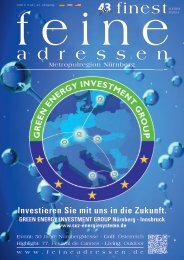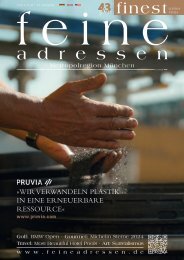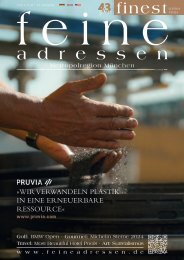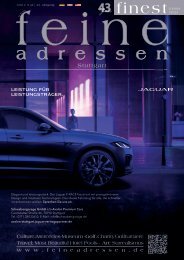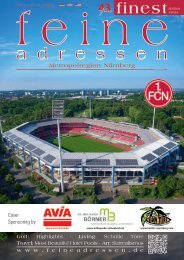»feine adressen – finest« – München 4 20
Automobile: BMW iX · Culture: 34. Jüdische Kulturtage · Fashion: Stilvoll warm · Travel: Sehnsuchtsziele
Automobile: BMW iX · Culture: 34. Jüdische Kulturtage · Fashion: Stilvoll warm · Travel: Sehnsuchtsziele
Sie wollen auch ein ePaper? Erhöhen Sie die Reichweite Ihrer Titel.
YUMPU macht aus Druck-PDFs automatisch weboptimierte ePaper, die Google liebt.
finest interview | 21 b<br />
Gleichzeitig besteht aber ein deutlich höheres Wert stei gerungs<br />
potenzial als auf dem flachen Land, weil viele Menschen<br />
zwar nicht mehr im Stadtzentrum, aber doch in Stadtnähe<br />
wohnen möchten.<br />
Sollte eine renovierte oder grundsanierte Immobilie nicht<br />
vielfach die bessere Empfehlung sein?<br />
Das hängt von Lage, Preis und den individuellen Ansprüchen<br />
ab und lässt sich nicht pauschal beantworten. Ein Neubau ist<br />
zwar teurer, hat aber auch mehr Wert und ist auf die persönlichen<br />
Bedürfnisse besser zugeschnitten. Bestandsimmobilien<br />
bedeuten fast immer einen Kompromiss, sind dafür aber häufig<br />
erschwinglicher.<br />
Wo und wie kann Ihre Branche mit nachhaltigen Bau- und<br />
Wohn-Lösungen zum Klimaschutz beitragen?<br />
Beim Wohnen gibt es bereits vielfältige regulatorische und<br />
technische Ansätze, um den Energieverbrauch und -verlust<br />
durch Heizen zu verringern. Beim Bau sehen wir Trends hin<br />
zur Verwendung von umweltschonenderen Baumaterialien,<br />
wie zum Beispiel Holz, aber auch technische Lösungen wie<br />
Building Information Modelling und Modulbauweise, die<br />
den Ressourcenaufwand verringern.<br />
Welche Perspektiven sehen Sie für die Bau- und Immobilien<br />
branche für die Zukunft?<br />
Die Themen Klimaschutz, Nachhaltigkeit und Digitalisierung<br />
werden uns sicherlich begleiten. Besondere Relevanz werden<br />
zum Beispiel die zukünftige Gestaltung der Innenstädte und<br />
die Elektromobilität haben.<br />
Wir danken für das Gespräch.<br />
Unchanged Demand<br />
<strong>»feine</strong> <strong>adressen</strong> <strong>–</strong> <strong>finest«</strong> spoke to Jürgen Michael Schick, president<br />
of the Immobilienverband Deutschland IVD, about the current<br />
situation in the real estate industry, sustainable construction and<br />
living and the future of the real estate market.<br />
How does the current situation affect the property market?<br />
COVID-19 shows different effects on the real estate markets. The submarket<br />
for retail and hotel properties is indirectly very strongly affected<br />
by the second lockdown. A growing number of commercial rent defaults<br />
can be expected, which will put pressure on rental and purchase prices.<br />
By contrast, the market for flats and residential buildings is hardly<br />
affected at all. Demand from users and investors remains high.<br />
Has the reduction in VAT from 19% to 16% in recent months<br />
had an impact on property decisions?<br />
As no VAT is levied on the purchase prices of owner-occupied property,<br />
there is no direct effect on the purchase decision. However, the<br />
crisis has motivated many tenants to think about buying owneroccupied<br />
housing. Because homeowners are more resilient in a crisis.<br />
They are independent of landlords and rising rents. The pandemic<br />
has also changed the relationship to one’s own four walls radically.<br />
In recent years, homeowners benefited greatly from the very low<br />
level of lending rates. How do you assess the future development of<br />
property financing?<br />
Interest rate hikes by the European Central Bank are unlikely to<br />
be an issue for the foreseeable future. In order to dampen the economic<br />
consequences of the pandemic, a liquidity-oriented interest<br />
rate policy is necessary. A turnaround in interest rates and a rise<br />
in lending rates are therefore highly unlikely in the coming years.<br />
City or countryside <strong>–</strong> where is the construction of a new residential<br />
property more worthwhile today?<br />
The most interesting are certainly the so-called intermediate areas,<br />
such as the surroundings of a metropolis. Land prices there are<br />
often many times lower than in the city. At the same time, however,<br />
there is a much higher potential for value appreciation than in the<br />
flat countryside, because many people no longer want to live in the<br />
city centre, but still want to live close to the city.<br />
Isn’t a renovated or thoroughly refurbished property often the better<br />
recommendation?<br />
This depends on location, price and individual requirements, and<br />
cannot be answered in a generalised way. A new building may be<br />
more expensive, but it also has more value and is better tailored to<br />
the personal needs. Existing properties almost always represent a<br />
compromise, but are often more affordable.<br />
Where and how can the real estate industry contribute to climate<br />
protection with sustainable construction and housing solutions?<br />
There are already a variety of regulatory and technical approaches<br />
in the residential sector to reduce energy consumption and losses<br />
when heating. In construction, we see trends towards the use of<br />
more environmentally friendly building materials, such as wood,<br />
but also technical solutions such as Building Information Modelling<br />
and modular construction that reduce the use of resources.<br />
What prospects do you see for the construction and property sector<br />
in the future?<br />
The issues of climate protection, sustainability and digitalisation<br />
will certainly accompany us. For example, the future design of city<br />
centres and electromobility will be of particular relevance.<br />
Thank you for the interview.<br />
www.ivd.net






